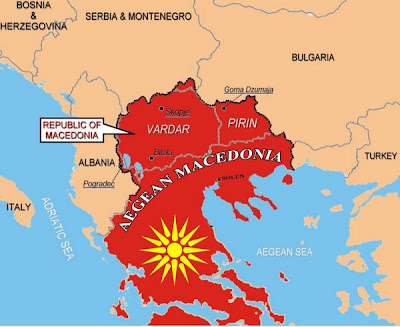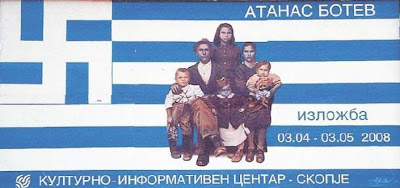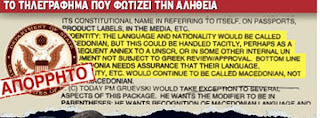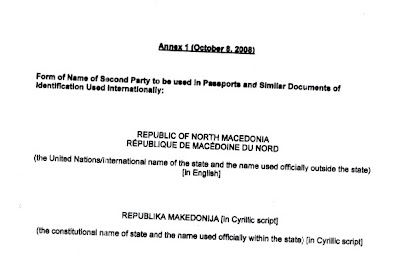The birth of the 'People's Republic of Macedonia'
In Europe there are many place-names which have strong historical associations, but none more so than Macedonia [1]. It is a measure of the fame of the ancient Macedonians, that their name has survived for over 2,500 years to describe a corner of the Balkan Peninsula, long after they themselves ceased to play any important part in European history.
Today the geographical boundaries of Macedonia are difficult to define, however, little is known about the new 'Macedonian question'.
For instance:
How well known is it in the world that in the Balkans there are two Macedonias, separated by a common frontier?
How many people know that the northern small landlocked Slavonic Macedonia, known officially as the Former Yugoslav Republic of Macedonia (FYROM), has a seat at the UN, whereas the historical Greek Macedonia does not, because it is not a state but only a province of Greece?
How many people know how and when this multi-ethnic state was created ?
In order to forge a new nation-state from a population, various parts of which possess a different national/ ethnical background or consciousness, you need three key elements: a political motive, fabricated history and a fabricated language.
Let's examine how the state of FYROM was created.
The geographical area which makes up FYROM today did not appear as 'Macedonia' on any map before the Second World War. Its population is mainly Slavonic and Albanian. In 1944 Tito announced the creation of the 'People's Republic of Macedonia' in order to provide a launching pad from which to lay claim to Greek Macedonia and the warm-water port of Thessaloniki [2]. While the Western Allies were busy planning the future of the Balkans, others had already shaped it. By the last quarter of 1944, the communists were the indisputable rulers in Yugoslavia and were working hard to become so in Bulgaria too.
POLITICALLY Tito had turned the old "Southern Serbia" (named as Vardarska Banovina) into the "People's Republic of Macedonia", without taking the trouble to consult his Bulgarian or Greek comrades as he entertained designs for the incorporation of all parts of geographical Macedonia into his new federal unit [3]. The 'People's Republic of Macedonia' was a political creation only, since its population, a polyglot conglomeration of nationalities, had no substantial "Macedonian" national consciousness. Tito's Macedonia, with Skopje as its capital, was created in the same manner as Stalin's Belorussia after the end of the Bolshevik revolution.
ETHNOLOGICALLY, Tito's new "Macedonian" republic was to be forged out of a population with ethnic and linguistic ties to Albania, Bulgaria or Serbia. The 1940 official Yugoslav census recognized only two large ethnic groups in Vardar Province: Slavs at 69% and Muslims at 31%. In 1945, three years after the formation of the 'People's Republic of Macedonia', the Slavs disappeared from the census and were replaced by 66% 'Macedonians'!
By recognizing the existence of a separate 'Macedonian' nation, the Communist Party of Yugoslavia was able to gain control of Vardar Macedonia and justify retaining it as part of the Yugoslav federation [4]. In order to accomplish this it was necessary to eliminate the sense of Bulgarian national identity shared by many inhabitants of the area. Since this was clearly not in the interests of Yugoslavia, and since the inter-war policy of Serbianization under the Yugoslav Kingdom had failed, the only alternative was to recognize the Slavs of Vardar Macedonia as neither Bulgarians nor Serbs, but as something else as……….."Macedonians".
Recognizing the 'Macedonian' nation and establishing the 'People's Republic of Macedonia' was the most effective way for Yugoslav officials to integrate Vardar Macedonia securely into the Federal Republic of Yugoslavia. Another motive behind the Communist Party of Yugoslavia's decision to recognize the existence of a separate Macedonian nation was its desire to extend Yugoslav control over Bulgarian and Greek Macedonia as well [5].
LINGUISTICALLY the new nation needed a language and script. Initially the spoken dialect of northern geographical Macedonia was chosen as the basis for the "Macedonian" language. To sever the linguistic bonds between the "Macedonians" and the others slavic speakers (Serbs and Bulgarians), this new language was fabricated and touted as a separate Macedonian language, the language, it was said, of Alexander the Great!
Hupchick explains: "The new 'Macedonian' literary language intentionally was based on a dialect spoken in the central Vardar area (Prilep-Bitola region) to remove it geographically as far as possible from Bulgarian and Serbian linguistic 'contaminations'. A separate 'Macedonian'Cyrillic alphabet (including wholly new letters & a few Serbiancharacters) was devised to make the language different from Bulgarian.'Bulgarianisms' were replaced by folk substitutes, and modern Bulgarian, Serbian or Russian technical words and modern expressions intentionally were avoided in favor of Western (including American) terms. Literary Macedonian was as different as humanly possible from other slavic languages, being a veritable linguistic hodgepodge approaching the French meaning of macedoine when referring to a mixed salad" [6].
To complete the charade, Tito's regime commissioned the linguist Blago Konev (he changed his name later to Blaze Koneski) to devise an new alphabet. Koneski modified the Serbian version of the Cyrillic alphabet and called it the "Macedonian alphabet". Koneski and his linguistics also modified the Old Church Slavonic, (now named in the FYROM as "old Macedonian"), and fabricated the lexicon of the "Macedonian" language from a mixture of Bulgarian, Serb, Croat, Slovenian, and other Slavic languages. The alphabet was accepted on 3 May 1945 and the orthography on 7 June 1945.
The writing of a history for the 'People's Republic of Macedonia' had the same goal as the creation of the language - to de-Bulgarianize the Slavs of Vardar Macedonia and create a separate national consciousness. Since Marx claimed to have discovered the immutable laws of history, communists have considered the "correct" interpretation of history as the foundation of all social science and a key element of nationality. As usual in the Balkans, history is a primary ingredient in the development of national consciousness. Hence, the Yugoslav communists were most anxious to mould the history of the Macedonian region to fit their conception of Slav-Macedonian consciousness.
In the 1960s and 70s, the Yugoslavs established committees to concern themselves with the "Macedonian" language and ethnicity in Yugoslavia and abroad, trained teachers in the language, and sent linguists to America, Canada, and Australia to teach the language and present lectures on the existence of a special Slavic race, related to ancient Macedonians.According to a 1944 U.S State Department Airgram, the U.S considered, "talk of Macedonian "nation", Macedonian "Fatherland", or Macedonia "national consciousness" to be unjustified demagoguery representing no ethnic nor political reality, and sees in its present revival a possible cloak for aggressive intentions against Greece" [7].
What has changed so that the USA and the Bush administration, through its recognition FYROM as 'Macedonia' in 2004, now supports these aggressive intentions against Greece?
To be continued……..
NOTES
[1-] http://www.etymonline.com/. English term of "Macedonia" derived from the Latin Macedonius "Macedonian," from Gk. Makedones, lit. "highlanders" or "the tall ones," related to makednos "long, tall," makros "long, large"(see macro-).
[2] International Organization, Vol. 1, No. 3, (Sep., 1947), pp.494-508. Appointed under the Security Council resolution of December 19, 1946, the "Commission of Investigation Concerning Greek Frontier Incidents" on May 27, 1947 submitted a report, to the Security Council.The general conclusion of the UN Commission as about Macedonia issue, was that Yugoslav and Bulgarian Governments themselves revived and promoted a separatist movement among the Slav minorities in Macedonia.In making this finding, the Commission pointed out that some 20,000 Greek citizens had fled to Yugoslavia and some 5,000 to Bulgaria — most of them Slavs — and that the treatment of this group by Greek officials had "provided fertile breeding ground for separatist movements." In Yugoslavia, Macedonian separatism was the special goal of an organization called the NOF (National Labor Front) which had its headquarters in Skopje and Monastirion(Bitola).
[3] The Macedonian Question, Britain and the Southern Balkans 1939-1949, Dimitrios Livanios, page 245.
[4] -Yugoslav Communism and the Macedonian Question, Palmer and King , page 199.
[5]- The Macedonian Conflict, Loring Danforth, page 66.
[6]- Dennis Hupchick, The Balkans from Constantinople to Communism, 2002, p.430.
[7] -US Department, CircularAirgram(868.014/26 Dec. 1944)
I could never completed this article without the extence help and support of the macedoniaontheweb members.



 Australian Macedonian Advisory Council
Australian Macedonian Advisory Council










